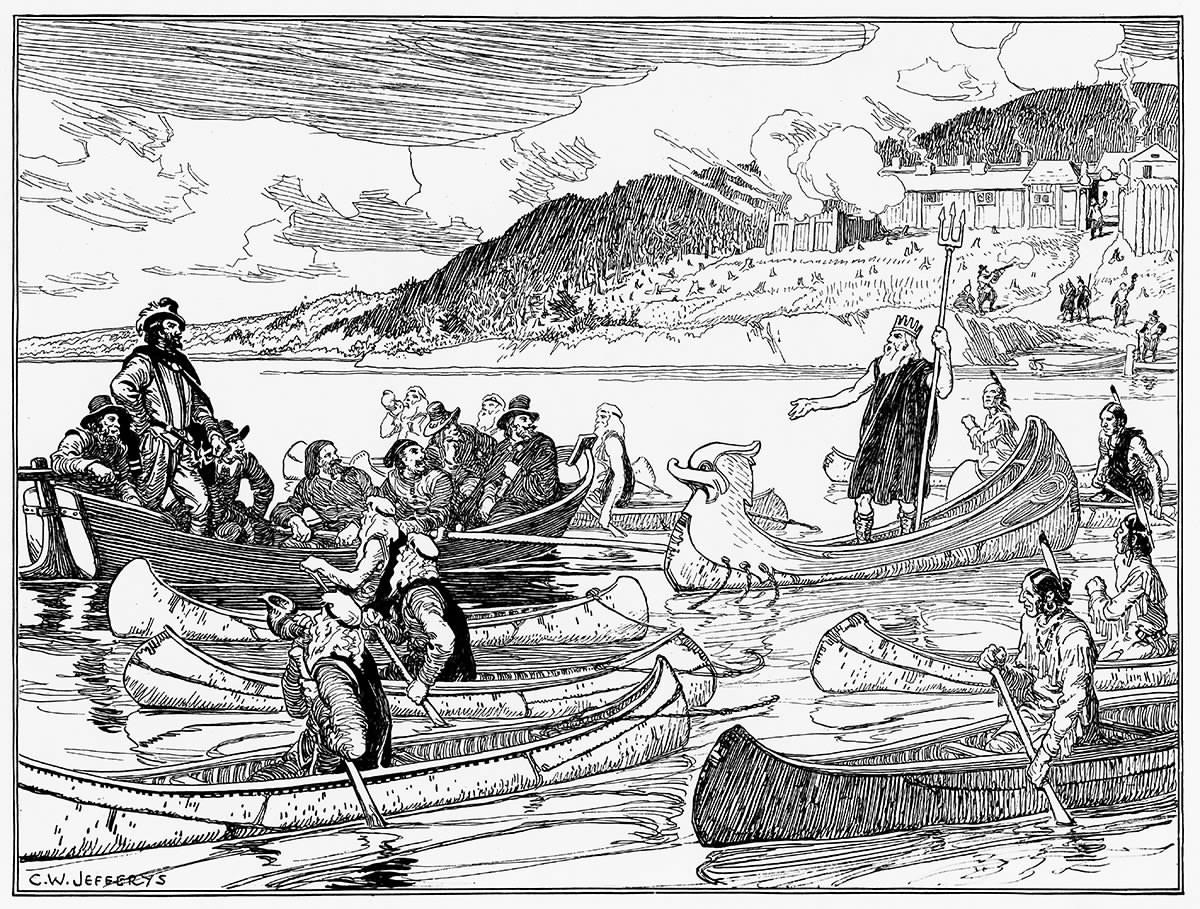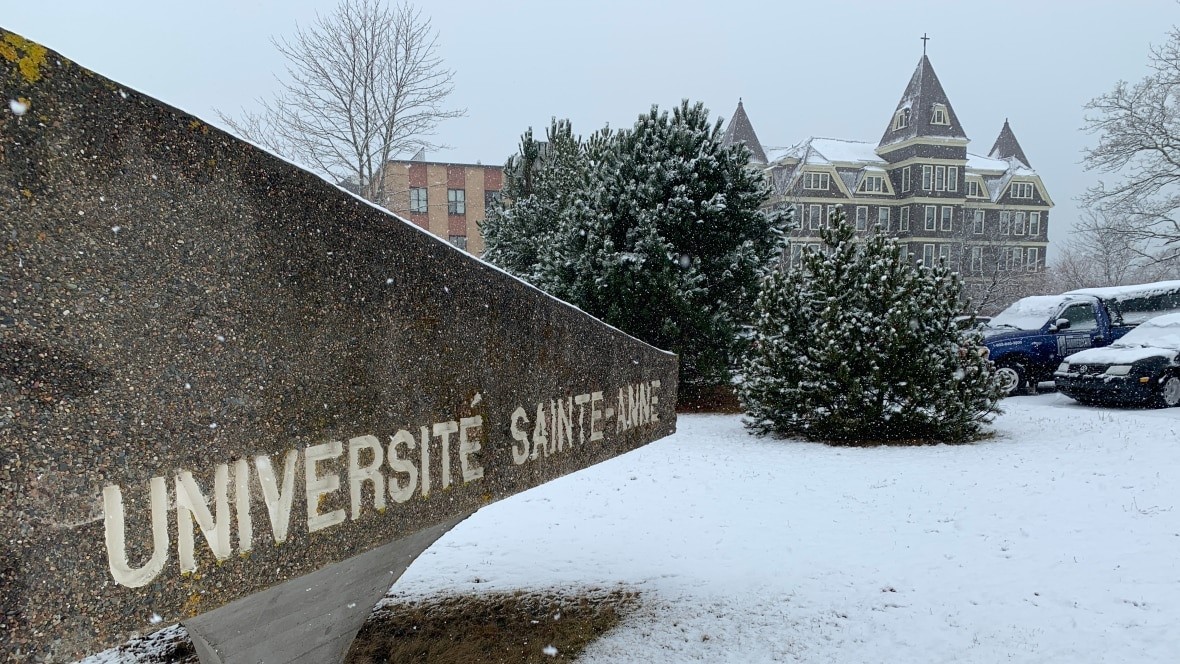
The capture of Louisbourg, June 28th, 1745 (artist Peter Monamy, public domain)
VENI, VIDI, VICI
At the outset, know that Nova Scotia is a Latin name meaning “New Scotland”. The province was named by Sir William Alexander to whom King James VI of Scotland gave the land in 1621. Before obtaining its official name, the Mi’kmaq First Nation designated it under the name “Mi’kma’ki” (land of the Mi’kmaqs), the French called it “Acadia” and for the Anglo-Americans it was “New Scotland” meaning Nova Scotia.
Regarding the origins of the word “Acadia”, the Maliseet (the other major Aboriginal nation in Acadia) used the word “Quaddy” to mean where the land is fertile, for others Cadie Country. Then, the word Larcadia appeared on 16th century maps. In 1603, Pierre Dugua de Mons accepted from King Henry IV of France privileges to trade and fish against the responsibility to establish a colony in America. Under this concession, he also received the title of lieutenant general “of the coasts, lands and borders of Acadia, Canada and other places in New France” to establish 60 settlers per year and to christianize the First Nation peoples. They came (VENI) mainly from the regions of western France, notably, Aunis, Saintonge and Poitou.
Foundation of Port-Royal



An attempt at colonization took place in 1604 on a small island named Sainte-Croix in the mouth of the river bearing the same name. Winter was harsh, and scurvy killed nearly half of all men. The following spring, the settlers moved to Port-Royal Basin (now Annapolis Basin) and built a new residence with several small dwellings protected by a palisade. Thus, was born Port-Royal, the capital of Acadia. In 1606, Samuel de Champlain founded the Order of Good Cheer and Marc Lescarbot, lawyer and writer, presented “Théâtre de Neptune” on the calm waters of the basin. It was the first French-language play in the New World. In addition, Louis Hébert, an apothecary from Paris, became the first settler in Canada to derive his self-sustenance from the soil. The following year, the vessel Jonas brought bad news: the concession granted to de Mons having been canceled, the settlers had to return to France. The custody of the buildings was entrusted to the Mi’kmaqs. After three years of absence, colonization resumed. The Port-Royal residence was found to be in very good condition. Starting in 1632, French people immigrated regularly in small numbers for nearly 80 years.
Yesterday’s and today’s Acadia
From Port-Royal, the Acadians gradually migrated south, along the coast, creating small fishing villages (for instance Pointe-de-l’Eglise on St. Mary’s Bay and the Pubnicos), as well northward establishing farms, from Rivière-aux-Canards and Grand-Pré in the Minas basin, to Beaubassin (Amherst) via Cobequid (Truro). They also inhabited the Tracadie-Pomquet region near the Strait of Canso, as well as the Acadia of Chezzetcook in Halifax Regional Municipality. The Acadians were undoubtedly the first pioneers of Nova Scotia. They saw (VIDI) the spirit and soul of both Mi’kma’ki and Quaddy.
In 1713, France ceded Peninsular Acadia to England, that is Nova Scotia with the exception of Cape Breton Island. Four decades later the Great Upheaval disrupted the Acadian people’s daily life. There exists no doubt the objective of the mass deportation of Acadians between 1755 and 1762 was to get rid of them all for good. According to writings of the Lords of boards in London “…the French of Nova Scotia will never become good subjects to His Majesty”. The then colonial governor, Charles Lawrence, ordered that any standing building be burned to the ground to ensure an expulsion without return. This goal was a true failure. The tenacity of the Acadian families prevailed and gave them an indisputable victory (VICI).
According to Nova Scotia archives, Acadians today live in all parts of the province. Université Sainte-Anne (with five campuses) is the only French-language university in Nova Scotia. It is an institutional pillar of contemporary Acadia.

List of the Acadian communities
- Port Royal (Annapolis Royal)
- Victim of intermittent wars between two empires - St. Mary’s Bay (Clare)
- A bubble of France in Acadia’s cradle - Antigonish County
- With the help of the Cod King - Cumberland County
- The Elysean Fields of Minudie - Chezzetcook (Halifax)
- A pleasant irony to know - Windsor
- From Pisiguit to Philadelphia’s Graveyard of the Poor - Pubnico (Pobomcoup)
- Avenging deportation - Truro
- The expulsion of Cobequid’s inhabitants remains a secret of history - Grand-Pré
– A monument to the exceptional tenacity of a people - Amherst
- Beaubassin put to death by the French administration - (Canard) Rivière-aux-Canards
- If only America’s black ducks could speak - Louisbourg (Cape Breton Island)
- A threat to the Anglo-American colonies - St. Peters (Cape Breton Island)
- The veterans gave back Port Toulouse its original name - Chéticamp (Cap Breton Island)
- Evocative names of Acadian places

